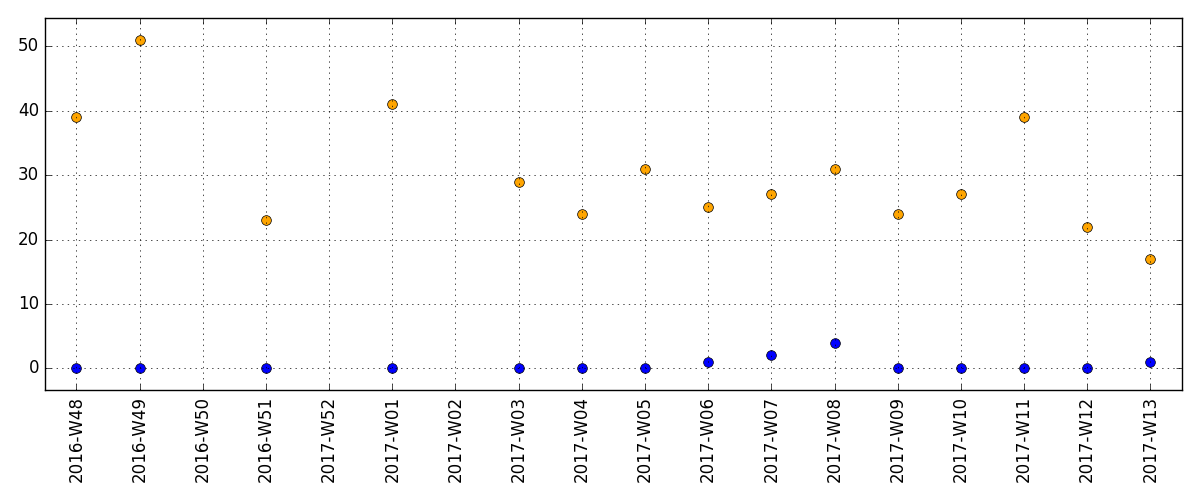Collaborating with our colleagues from IVT – Institute for Transport Planning and Systems at ETH Zurich, our extended abstract titled “Usage patterns and impacts of a mobility flat rate traced with a Smartphone App” was accepted at IATBR 2018 in Santa Barbara, California.
OMLETH at Innovedum Event 2017
The annual Innovedum event on November 23 at the Semper Aula was an opportunity for informal discussion among the Innovedum project leaders, departmental Educational Developers, and students. Around 150 participants attended the event. The Rector gave the welcome speech and presented certificates to the students for their efforts on behalf of Student Innovedum. The event’s highlight was the short presentation of three Innovedum projects under which OMLETH was shown. Martin Raubal and Christian Sailer presented the project and showed the brand new OMLETH explainer video (only in German), which received much positive feedback and interesting discussions at the aperitif.
Photos from the evening by Heidi Hostettler
http://www.heidi-hostettler.ch/Innovedum_2017
The new video OMLETH explainer video
Continuous Trajectory Pattern Mining for Mobility Behaviour Change Detection
Due to recent technological developments, it is now possible to track our movements at a high level of detail and with relatively low effort and cost, e.g., by using built-in GPS-receivers of our smartphones. This novel data source provides exciting new possibilities for increasing the sustainability of our mobility behaviour through monitoring as well as real-time regulation and management of our transport systems. For instance, there are now innovative systems which aim to monitor and directly influence our mobility decisions by providing eco-feedback (e.g., GoEco!). Such systems rely on identifying when and how their users change their behaviour, and e.g., form more sustainable travel habits. This time-consuming and cost-intensive task is currently mostly done manually. In general, however, methods to automatically detect and evaluate behaviour change are needed for understanding how people will react to new mobility options such as electric vehicles, the shared economy or mobility as a service (MAAS).
In this study, we propose a concept for a fully automated system which continuously monitors movement behaviour based on a stream of movement data, and uses data mining techniques to detect behavioural anomalies.

A particular problem here is data incompleteness caused by people not using the tracking application continuously. As these may trigger false alarms, we have to identify and filter these incomplete records in a separate step (Completeness Assessment). Another problem are behavioural changes which are not caused by changing travel habits, but a different contextual situation (e.g., a holiday trip). By additionally comparing the places which are visited by a person, our system is able to filter those temporary anomalies.

The figure shows the mobility behaviour anomalies (blue) and the place-related (yellow) anomalies for a user of our test sample. Behavioural anomalies are detected from calender week 2017-06 onwards. Since the visited places remain the same, we can conclude that this user indeed changed her mobility behaviour habits. In the future, a fully automated system could interpret and automatically react to this behaviour change, e.g., by sending out notifications to the users or analysts, triggering a response (e.g. encouraging or discouraging the observed behaviour change), logging the occurrence of the anomaly in a database, or providing information to an expert for decision support.
For more information, see
Jonietz, D., Bucher, D. (accepted): Continuous Trajectory Pattern Mining for Mobility Behaviour Change Detection. Accepted at: LBS 2018, Zurich, Switzerland.
The MIE Lab is growing!
We welcome Henry Martin as our new team member! With his focus on mobility data analysis, Henry will fit perfectly into the MIE Lab.
News Article in NZZ about SBB Green Class
On the 21st of October, the NZZ reported about the planned one-year extension of the project SBB Green Class, for which we provide the lead scientific support. In the article, Prof. Dr. Martin Raubal reports on selected preliminary findings.
Best Paper Award Nominee at Energieinformatik 2017
Our paper “Using Locally Produced Photovoltaic Energy to Charge Electric Vehicles” shared the second place for best paper with a contribution from the University of Bamberg / LAGRAR at D-A-CH+ Energieinformatik 2017.
You can find more information about the paper in our previous post and on our publications site.
3 papers accepted at LBS 2018
Collaborating with colleagues from the GeoGazeLab and the University of Zurich, we have two full papers and one short paper accepted at next year’s LBS conference, which will take place in Zurich, Switzerland. For more information, visit our publications site.
Best Poster Nomination at the 4th SCCER Mobility Conference
The poster “Extracting Eco-Feedback from Movement Trajectories“, which we presented in collaboration with our colleagues from SUPSI, was nominated for the Best Poster Award at the 4th annual SCCER Mobility Conference in Zurich, Switzerland.
Over 120 participants from research and industry attended the conference and discussed relevant research topics and projects from the transport and mobility domain. Andreas Lischke (DLR Berlin) and Michael Frambourg (Volkswagen AG) held keynotes on the future of heavy-duty freight transport as well as future plans towards more sustainable passenger cars.
Both speakers emphasized the importance of an (economic and scientific) investement in alternative fuels next to pushing battery technologies forward. This point was later again highlighted, within the context of the rising shares of CO2 emissions from flight travels. With respect to Switzerland, three key topics were discussed in particular: 1) the logistics challenge, 2) passenger mobility in cities and regions, and 3) energy for transportation.
2. Best Paper Award at COSIT 2017
We are happy to announce that our paper “Timing of Pedestrian Navigation Instructions” was elected 2. Best Paper at COSIT 2017 conference in L’Aquila, Italy!
Interview with Prof. Martin Raubal on the Project SBB Green Class
Prof. Martin Raubal has answered questions regarding our data analyses in the course of the SBB Green Class Project. The full interview (in German) can be found here.